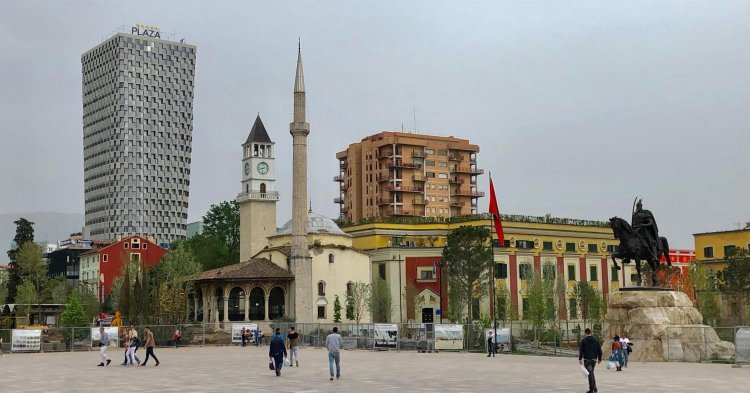Albania – this summer, I was finally able to spend some time there again and see how the country has moved forward. And it has done so indeed: Skanderbeg Square has been transformed into a true urban centre, highway and road constructions are advancing, the beaches of Vlora and Saranda are filling up. The latter is partly also seen with wariness, not least because of rising prices. On the positive side – so I want to claim at least – tourism will help to improve the country’s image. Those who come to this relatively unknown part of Europe will see that it fits perfectly between Montenegro and Greece – culturally, culinarily, scenically.
The people? Welcoming and proud. Exemplarily, the different confessions live side by side in this completely secular state whose history dates back to Antiquity, to Illyrians and Romans, to Venetians and Ottomans. The national hero Skanderbeg – previously an Ottoman commander himself – united his people against the latter. After his death, however, a big share of the population set sail to Italy where an Albanian minority has lived up until today. The connection persisted over the centuries, until the country ultimately withered to a vassal state of the Duce before falling into communism’s hands in the course of the 20th century. Still today, Italian remains widely spoken.
The people? Welcoming and proud.
Generally, people seem to be quite competent linguistically. I talk to my local friends and acquaintances in English and German without any problems whatsoever. Many of them have lived abroad, had their families managed to escape from the dictatorship or the unrest in 1997. Famous descendants of the Kosovan-Albanian diaspora include popstars like Rita Ora, Dua Lipa and Era Istrefi, and thus it should be no wonder that the country can especially offer one thing: nightlife – be it in an elegant Italian 1930s villa, a rooftop bar high above the capital or while clubbing at the beach. But outside their country, Albanians are mainly faced with prejudices, such as propensity to violence. But even if arguments can get a little loud here, one principle prevails: be respectful and you, too, shall be met with great respect.
The family is held in high esteem, and to meet someone’s family is the greatest honor. I was accorded this honor during my stay: I managed to drive the rental car into the centre of Kruja, a scenic and historically important mountain town. Then I was picked up by my friend who navigated his car – back and forth – through those terribly narrow streets. I couldn’t hold back and just started to laugh, it really felt like a rollercoaster ride. Yet… I didn’t feel unsafe at any time. He knew what he was doing.
When we arrived, the table was generously dished up. My friend’s daughter will have a wonderful life, I thought. On the contrary, the hard life has left its marks on his parents. And yet there is this glance of optimism in their eyes. Why not? During dictator Hoxha’s reign, the father was imprisoned, now he’s sitting in the garden of his house in the slopes of Kruja, for which people would envy him in Central Europe; looking down to the Cape of Rodon which shimmers through the sunlight from afar. Who could blame them for their optimism?
Albania is in progress. Which way the journey is heading seems to be clear: Europe. Yet, people are still talking about it with a certain distance, they’re not yet viewing themselves as a complete part of it.
The more recent history, though, is not that atypical for the region: long controlled by one strongman, the people overthrew the regime in the early 1990s, tearing down the dictator’s statue (Hoxha having already died in 1985). But the country was internationally isolated, as Hoxha had broken with both Stalin and Tito.
Albania is in progress. Which way the journey is heading seems to be clear: Europe.
Meanwhile, Albanians have begun coming to terms with their past. Two of the numerous bunkers Hoxha erected throughout the country have been transformed into museums dealing with the cruelties of the last century. The country has opened up for sure: not only did I see former buses of my hometown Vienna’s public transport operator, but also found a Viennese sausage stand in Tirana.
For quite some time now, Albania has been a reliable NATO partner and cooperates in many other fields with its European neighbours, but there is consensus on the path to the future: seeking EU membership. Nonetheless, people are aware that there is a long way to go. They do denounce what’s wrong in their country, first and foremost corruption. But they ask: who, if not Europe, will help us?
An appeal which should not go unheard. Global and regional powers are already touting for influence on the West Balkans. Turkey is investing in religious facilities, the airports are operated with Chinese money (meanwhile there are actually good Chinese restaurants in Tirana as well, by the way). This is not bad at all, the country does need investment – Europe must just not lose out. Its attraction hasn’t faded and therefore it shall be welcomed that the EU wants to initiate accession talks with the small country in mid-2019.
This will be a long road, a rocky one. But one that is worth taking. Because one thing is clear: Albania is Europe, Albanians are true Europeans. We should not forget about that.


